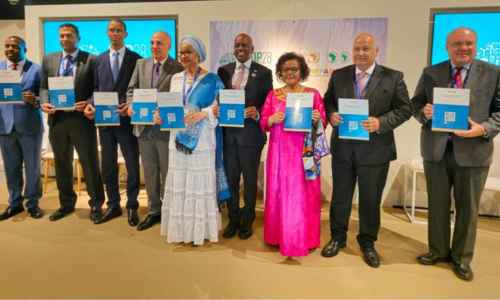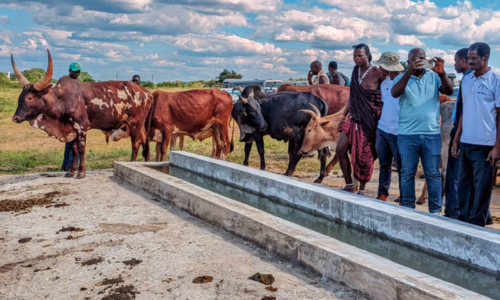Regional impact
Mobilising investment across Africa
The African Union Commission and International High-Level Panel on Water Investments for Africa launched the Africa Water Investment Action Plan at a COP28 side event hosted by GWP Southern Africa in December 2023. The Plan outlines how countries across the continent can mobilise the additional US$30 billion per year they need to meet Sustainable Development Goal 6 and ensure water security and sustainable sanitation on the continent.

Through GWP’s role as the Secretariat of the High-level Panel, GWP Southern Africa helped convene a series of global consultations alongside the African Union Commission, attended by representatives of African Union Member States, international development partners, the private sector, and civil society organisations.
“Currently, only US$10–19 billion is invested each year,” said Dr Hani Sewilam, President of the African Ministers’ Council on Water and Minister for Water Resources and Irrigation for the Republic of Egypt. The Plan raises ambition much higher. It supports implementation of the High-Level Panel’s landmark report Africa’s Rising Investment Tide – launched at the United Nations 2023 Water Conference – and the Continental Africa Water Investment Programme, led by GWP through the Africa Coordination Unit and other partners. The Plan provides a guide for directing these resources into climate-resilient water investments that will achieve water security and sustainable sanitation.

Improving transboundary water management in Mozambique and Zimbabwe
The first tri-basin commission in the Southern African region – the Buzi, Pungwe, and Save Watercourses Commission (BUPUSACOM) – launched in July 2023 to oversee the management of water resources within the BUPUSA shared basins of Mozambique and Zimbabwe. The basins have, over the years, suffered from extreme climate effects such as floods, droughts, and cyclones. The Commission will promote a collaborative and coordinated approach to building resilience against worsening climate shocks, enabling the capacity of the two governments to increase preparedness for floods and droughts. It is also set to unlock investments for infrastructure development and irrigation and address environmental concerns in the basins.
GWP Southern Africa supported the governments of Mozambique and Zimbabwe in negotiating the Save Water-Sharing Agreement and the BUPUSACOM Establishment and Hosting Agreements. This support was provided under a Global Environment Facility–funded transboundary project implemented by the International Union for Conservation of Nature, with GWP Southern Africa as the regional executing partner enabling the two governments. GWP Southern Africa will continue to support the Commission in completing its Transboundary Diagnostic Analysis and securing resources for the tri-basin Strategic Action Programme and National Action Plans, which will outline priority interventions and investments.
The agreements were signed off on the back of two previous negotiations, the Pungwe Water Sharing Agreement from 2016 and the Buzi Water Sharing Agreement from 2019. GWP Southern Africa provided support to the Mozambican and Zimbabwean governments during the negotiations that led to the signing of the Buzi Agreement.
Top/header photo: Hon. Cecilia Chamutota, Deputy Minister of Public Works, Housing and Water Resources in Mozambique officially launching BUPUSACOM

Promoting climate resilience with solar pilots
The Southern Africa Development Community (SADC), in collaboration with GWP Southern Africa, implemented two projects aimed at helping communities adapt to the adverse effects of climate change. In Tanzania, a climate-resilient IWRM pilot project drilled a solar-powered borehole for the Maasai community and their livestock in Ruvu Darajani Village. Approximately 2,000 livestock and 5,000 residents benefit from the water point, reducing siltation and pollution of their basin while improving their livelihoods.

In Botswana, a climate-smart agriculture pilot project was implemented in Metsimotlhabe. Here a solar-powered borehole was drilled for drip irrigation and hydroponics (growing plants without soil) for high-value horticultural production, to supplement the livelihoods of over 15,000 people including vulnerable groups like women and youth.
In 2023, SADC also implemented water–energy–food nexus pilot projects through the collaboration of partners including GWP Southern Africa. In Zambia, solar panels are pumping water from two boreholes to be stored for domestic, livestock, and irrigation purposes. In Malawi, solar panels pump water from Lake Malawi for irrigation and domestic use. Their electricity is also used at a nearby primary school and for other productive purposes. In both countries, the Ministries of Agriculture will continue to manage the projects to ensure long-term sustainability. In Malawi, the farmers were trained on how to operate the irrigation scheme and provided with a user manual, and joined an organisation called CIAT that will provide agricultural expertise and a market for their production.

